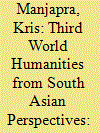| Srl | Item |
| 1 |
ID:
181678


|
|
|
|
|
| Summary/Abstract |
This essay serves as an introduction to a special section on the senses in late colonial India. Participating in the act of decolonising sensory studies, this collection explores the intersections between post-colonial studies and sensory studies by paying particular attention to the sensorium of the colonised. In the historical and geographical context of colonial South Asia, the senses are embedded in acts of distinction across race, caste, class, and bodily and gender hierarchies. The collection intervenes by paying attention to the relationship between power and sense perception as it finds register in media, scientific practices and literature of the period. Across the section, we suggest that making sense of empire is also to make sense of the sensory regimes of empire that have resonances in the contemporary.
|
|
|
|
|
|
|
|
|
|
|
|
|
|
|
|
| 2 |
ID:
163818


|
|
|
|
|
| Summary/Abstract |
This essay is a thematic and methodological introduction to the Bengali Intellectuals Oral History Project. This interpretive oral history collection reckons with and complicates the over-representation of Bengalis in the study of South Asian intellectual history. As editors, we propose a new framework to study intellectual life in the period of decolonisation—the study of Third World humanities from South Asian perspectives. We situate West Bengal and Bangladesh as important, but obviously not exclusive, vantage points from which to explore formations of Third World thought from the 1940s to the 1980s. Methods in oral history collecting and curation help us to comprehend the intelligibility of Third World humanities expressed from regionally grounded, and diasporically mobile, South Asian perspectives.
|
|
|
|
|
|
|
|
|
|
|
|
|
|
|
|